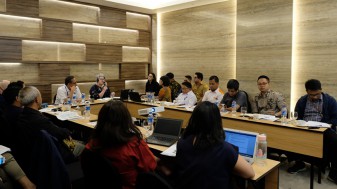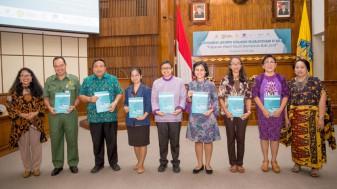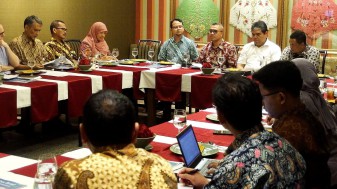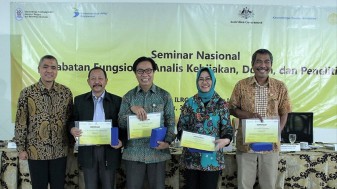The COVID-19 pandemic introduces a new dynamic spectrum of the rapidly growing of new knowledge. Not only does the virus have an impact on the health sector, but it also has profound implications on various other sectors. With the novelty elements that COVID-19 has brought, policymakers need new intervention strategies to deal with the pandemic appropriately.
In supporting efforts to tackle the pandemic, Knowledge Sector Initiative (KSI) encourages partners to play their role to provide an intellectual foundation in the discussion and formulation of public policies. A number of KSI partners which are policy research institutions (PRI), policy analysis associations, educational institutions, and both national and international media, have been actively producing relevant knowledge and building collaboration with the policymakers.
KSI develops COVID-19 Resource Center to collect relevant knowledge products produced by KSI partners. There are more than 300 knowledge products generated by 28 partners and contributors from various sectors, including politics, law and security, economy, health, poverty, and religion. These knowledge products come in various forms, with policy analysis making up the most of it.
Several PRIs in the field of poverty and inequality studies have timely provided their response to COVID-19. For instance, The SMERU Research Institute has developed a series of recommendations and policy responses to reduce the impact of the COVID-19 pandemic on the poor and vulnerable groups. In addition, the Institute for Research and Empowerment (IRE) published an infographic and writing series that focused on the economic impact of the COVID-19 outbreak in rural areas.
Meanwhile, on budget transparency, the Indonesian Forum for Budget Transparency (SEKNAS FITRA) issued a series of publications and recommendations related to the use of the state budget for handling the coronavirus. SEKNAS FITRA also developed a platform to monitor policies, budget, and implementation of response activities. This platform provides a news portal, analysis, and COVID-19 budget-related information.
Furthermore, the Indonesian Center for Law and Policy Studies (PSHK) published a series of press releases containing notes and recommendations to tackle COVID-19 from the legal perspective. PSHK has highlighted the overlapping governance in handling the pandemic, which has led to delays in the government’s anticipation and responses. These notes were complimented with recommendations for measures to improve pandemic response management. Meanwhile, The Institute for Policy Research and Advocacy (ELSAM) which focuses on the impact of laws and policies on Human Rights (HAM) has developed a series of publication related to the issue of personal data protection during the COVID-19 situation.
The Center for Strategic and International Studies (CSIS) adopts a multi-disciplinary approach in producing the study. CSIS has published more than one hundred commentaries related to COVID-19 which contains recommendations for various sectors, including health, politics, economy, social, culture and bureaucracy. CSIS also developed a Disaster Management Research Unit which focuses on sharing knowledge to strengthen disaster management in Indonesia. Meanwhile, to encourage inclusivity in the COVID-19 policy, the Australia-Indonesia Disability Research and Advocacy Network (AIDRAN) has developed Recommendations for People with Disabilities in the COVID-19 Response and tutorials to help them understand the situation and overcome the challenges.
Included in the list are several other KSI’s partners and PRIs who have been actively producing knowledge concerning COVID-19 responses, including the Association of Indonesian Policy Analysts (AAKI), the Indonesian Academy of Sciences (AIPI), AKATIGA, Article 33, BaKTI Foundation, Cakra Wikara Indonesia (CWI), Center for Innovation Policy and Governance (CIPG), Center for Health Policy and Management Universitas Gajah Mada (PKMK UGM), The Atma Jaya HIV/AIDS Research Center (PPH), Center for Islamic and Community Studies (PPIM) UIN Jakarta, Center for The Study of Religion and Democracy (PUSAD) Paramadina, Sajogyo Institute, Regional Autonomy Implementation Monitoring Committee (KPPOD), SurveyMETER, Universitas Indonesia Center for Study of Governance and Administrative Reform (UI CSGAR), and Company-Community Partnerships for Health in Indonesia (CCPHI).
KSI facilitates the dissemination of knowledge produced by KSI’s partners through various platforms and collaborations. One of which is through KSIxChange, a platform for KSI’s partners to convey updates, practices, findings and lessons learned regarding evidence-based policymaking in Indonesia. Relevant government agencies and both national and international development partners have involved in the KSIxChange platform. During the pandemic, KSI has held nine virtual KSIxChange with hundreds or even thousands of attendants at each session.
Opportunities for collaboration between PRIs and the government through a consortium mechanism were also explored. KSI identifies the potential collaboration between the Indonesian Institute of Sciences (LIPI) and KSI partners including a network of higher education partners who have an interest and capacity in the study of developing a public health system. One of the PRIs, PKMK UGM, is involved in the COVID-19 Research and Innovation Consortium formed by the Ministry of Research and Technology/National Research and Innovation Agency (BRIN). This consortium was formed to produce innovations that can answer the needs of society in dealing with COVID-19 in the form of products and research results. One of the studies developed by PKMK UGM is regarding the readiness of the regional health system to face the increase in the number of COVID-19 patients.
As an institution engaged in training, research and consultation, PKMK UGM developed a website-based COVID-19 Management Forum to facilitate the dissemination of innovation. The website was developed to strengthen the health system in dealing with COVID-19, starting from primary care to hospitals by involving cross-sectors. In this consortium, KSI identified the need to build a knowledge management system and repository for COVID-19 research, including connecting with KSI partners and a broader range of policymakers, such as Bappenas, the COVID-19 Task Force, or the Coordinating Ministry for Human Development and Culture (Kemenko PMK). PKMK UGM is developing the COVID-19 Management Forum using a knowledge management approach in collaboration with LIPI, which has a repository and depository system to store all research products.
Interaction and collaboration between KSI partners as knowledge producers and policymakers will support the evidence-based policymaking process. As Deputy for Social Sciences and Humanities at the Indonesian Institute of Sciences (IPSK-LIPI), Tri Nuke Pudjiastuti in the KSIxChange #24 discussion said, "Every institution must communicate with one another starting from the beginning of research to minimize errors in the policy,". Nuke emphasized the importance of collaboration and encouraged researchers in the social fields to actively engage and collaborate with the government to find better solutions for society.
In line with the notion, KSI brings together partners and policymakers through the KSI4RDI (KSI for Research, Development and Innovation) platform. Held twice a month, KSI4RDI have brought together KSI’s partners with policymakers in the discussion of several topics, including the Indonesian diaspora innovation research funding, the enrichment of innovation research ideas with integrated socio-ecological aspects, the development of national health systems, and the improvement of the quality of education and religious services in tackling COVID-19.
Furthermore, KSI collaborates with Think Policy Society to develop a synthesis of knowledge gathered in the COVID-19 Resource Center, to be presented to Bappenas’ COVID-19 task force, COVID-19 Consortium and other ministries.
Various efforts to generate, disseminate knowledge, and collaborate with stakeholders are expected to accelerate the recovery from the COVID-19 pandemic. KSI supports the evidence-based pandemic management approach by becoming a catalyst between knowledge producers and policymakers. KSI also encourages partners to be actively involved in policy advocacy, while at the same time working to build their institutional capacity to produce quality research and develop a robust supporting management system.






